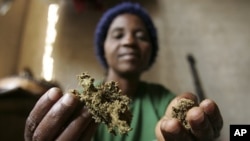World Health Organization officials on Monday called to regulate traditional medicine in Africa to protect the public against potentially harmful practices.
The announcement, which coincided with the U.N. body's commemoration of African Traditional Medicine Day, could have broad implications for the estimated 80 percent of Africans who rely on traditional practitioners for their primary mode of care.
Calling upon researchers to work with traditional practitioners to produce scientific evidence on the safety, effectiveness and quality of their products, Dr. Matshidiso Moeti, the WHO's regional director for Africa, issued a letter urging governments to strengthen regulatory bodies for traditional health practitioners.
"The benefits of traditional medicine are evident to all, [but] there is no doubt proper regulation is essential to the provision of quality, safe and effective health care products and services," Moeti said. "This is particularly important in rural areas where traditional medicine is sometimes the only affordable and available source of health care. Adherence to strict regulations would protect public safety by ensuring that traditional practitioners are properly trained and that their practice is endorsed by a regulatory body."
Moeti's letter would be expected to have a particularly resonance in the Mbankomo neighborhood of Yaounde — one of Africa's biggest hubs of traditional medicine. But in one of Mbankomo's larger treatment spaces, where fifteen different healers see a combined total of 30 to 50 patients each day, some patients were unmoved by the edict.
"I am very interested in traditional medicine because I have tested some of the medicines and my problem was solved," said Herman Hadir, a patient.
But for Africans who have no another option, as hospitals are often far away, expensive or poorly staffed, the consequences can be deadly. Last Sunday in Yaounde, for example, a 20-year-old woman died at the home of a traditional healer while having an abortion.
Indeed, even expert traditional practitioners say they would support efforts to create formal regulations, training and guidance.
"We need a law which will regulate traditional medicine," said Dr. Dewa, one of Cameroon's leading traditional medicine promoters, who goes by only one name. "You cannot find somebody faulty when there is no law. You cannot tell somebody that you don't have the right when there is no law guiding that is why there is this disorder. In fact, we will still continue to be singing like this until the lawmakers will come up with a law that will guide our profession."
According to Dr. Nick Ngwanyam, a gynecologist at the Saint Louis clinic in northwestern Cameroon, the traditional sector is now dominated by unqualified practitioners.
"We are talking about the proper diagnosis, scientific diagnosis of a problem and then the management," Ngwanyam said. "If we had proof that these things really work there will be no trouble. But, again, when something works that is not good enough. When something works we also have to make sure that it works and yet it does not also cause a problem."
Monday's announcement builds on a series of steps taken by the WHO's Regional Office for Africa to bring a regulatory framework to traditional medicine in Africa, including the 2010 "Guidelines for Registration of Traditional Medicines in the African Region."




